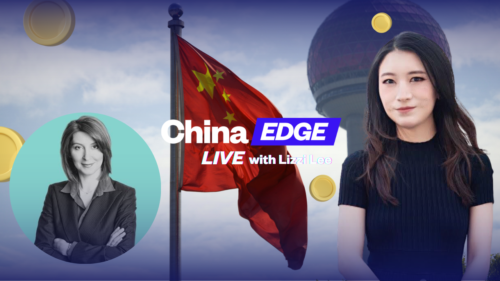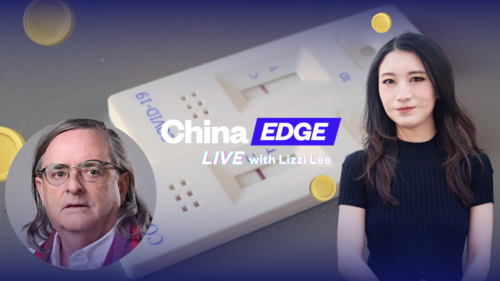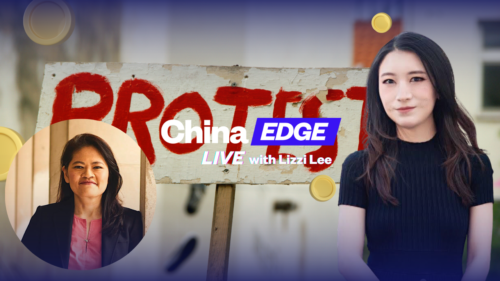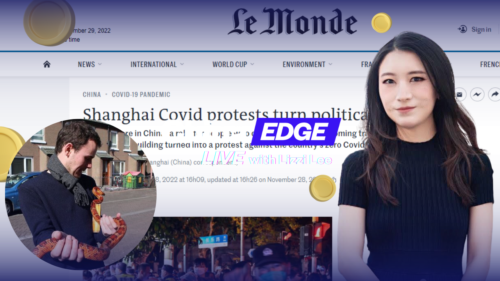Xi Jinping’s foreign policy scorecard: The view from Singapore | Live with Lizzi Lee
Bilahari Kausikan, former ambassador-at-large for the Ministry of Foreign Affairs in Singapore, shares his view on the U.S.-China rivalry.

In this episode of Live with Lizzi Lee:
Bilahari Kausikan, chairman of the Middle East Institute at the National University of Singapore and former ambassador-at-large for the Ministry of Foreign Affairs in Singapore, discusses his view on the U.S.-China rivalry, and why Singapore welcomes the U.S. to maintain the balance of power in the region.
Below is a transcript of the video:
Lizzi Lee: Joining me today is Ambassador Kausikan. You’re being called Singapore’s undiplomatic diplomat. I wonder if you can tell me a little bit about the nickname.
Bilahari Kausikan: Well, I think it’s based on a false assumption about diplomacy. Diplomacy is not just about being pleasant, agreeable, and tactful. It is about advancing your country’s national interests, preferably by being pleasant, agreeable and tactful. But if necessary, by whatever means are appropriate.
And I’ve always found in my career… I’m retired, by the way, you know that, right? I’ve always found in my career it is better to speak clearly rather than risk misunderstanding by trying to be too circumspect in how you express yourself. You don’t have to be rude to people, but you should be clear. Because diplomacy is ultimately about communication.
Lizzi: I want to start with U.S.-China relations. Many have characterized the pair as strategic rivals. Some even predict Cold War 2.0 in the decades to come. I wonder how you would characterize the U.S.-China bilateral relations.
Kausikan: Okay. Well, I think the competition between major powers is inherent in international relations. And that reality was masked for a short and rather historically abnormal period after the end of the Cold War. Because the overwhelming dominance of the U.S. masked that reality.
From 1972 when the U.S. and China resumed contact, there were periods of tension. There was rivalry. There were disagreements over Taiwan, over human rights issues. Tiananmen happened.
But by and large, the overall trajectory, despite these periods of tension and competition, was on engagement. Now it has flipped.
I don’t think engagement will completely be abandoned by either side. But it’s clear that the overall emphasis is on the competition. And I think this is going to be a long-term structural feature of international relations. But for that reason, because it is a long-term structural feature, we should understand it correctly, and accurately.
I really dislike this trope of “new Cold War” to describe U.S.-China competition. There are some superficial similarities between the earlier period of the U.S.-Soviet Union competition, but they are superficial. The U.S. and the Soviet Union led to different systems that were connected only at the margins.
The U.S. and China are both vital components of a single global system connected to each other and to the rest of us, Singapore, Japan, you name it. They are connected to each other and the rest of us by a new phenomenon that we have not seen in history before. And that new phenomenon is supply chains of complexity, of density, of a scope that has never before been seen.
And I think those supply chains are what distinguish the 21st century’s interdependence from earlier periods of interdependence. Now, I don’t believe that this single system, this web with which all of us are enmeshed, is going to separate completely into two separate systems, as existed between the U.S. and the Soviet Union in an earlier period. There has already been partial separation. The internet is very largely separated. There will be more separations in areas of technology that have national security implications. How the U.S. and China deal with big data is already separating — there are two different means of dealing with it. And there are other examples, but I don’t think you can completely separate it into two systems.
And that means that unlike the U.S. and Soviet Union, where competition was between systems, the U.S. and China are competing within a single system and will continue to do so. Neither of them particularly is comfortable with this. The West, or the U.S., talks about decoupling or at least reducing reliance on China in their supply chains. China talks about becoming more self-reliant in technology and relying more on domestic consumption to drive growth. And both of them will try to do this.
But it’s all easier said than done. And even if it can be done, it will take a very long time. And I don’t think it can be done totally. Now, competition within a system is fundamentally different from competition between systems.
For one thing, it is unlikely to end in a clear denouement as the U.S.-Soviet competition did. Because I think while the U.S. and China may want to dominate the single system, they don’t really want to destroy the other because they can’t without hurting themselves.
So it is a much more complex form of competition that is not going to end in any clear-cut outcome.
Secondly, it’s not a binary competition, and I think I can give you a very good example, which is a contemporary example, which is semiconductors. I think we all know that semiconductors, at the high end, have emerged as a very serious vulnerability for China.
And I don’t think it’s going to be very easy for China to plug that vulnerability or catch-up, because the semiconductor supply chain, which, by the way, is one of the most complicated ones in this world of complicated supply chains. All the very vital nodes held by the U.S. or allies or friends.
Whether you talk about materials or whether you’re talking about machine tools, whether you’re talking about certain chemicals, and of course, the three main fabricators are Taiwan, South Korea, and the U.S.
On the other hand, China is 40% or more of the world’s semiconductor market. And you can’t possibly cut off your own companies, those of your allies, and those of your friends for 40% of the market without doing them grievous damage. So it’s not a simple binary competition.
You see the latest regulations that the Biden administration has put into effect which are very serious in their effects on China. But almost immediately they gave exemptions to a Taiwanese company, TSMC, and a South Korean company. Because they are not producing in China, only for China. They’re producing for outside, too.
So China is in trouble as far as high-end semiconductors are concerned, but the U.S. cannot possibly cut it off completely. You’re going to have to be more discriminating in what you sell to China, and what you do in China, but you can’t separate yourself.
And that is a fundamental difference from the Cold War. I think it’s a much more complicated kind of competition.
Lizzi: Fantastic. And I want us to turn to Russia a little bit. As you know, the Ukrainian war has put Xí Jìnpíng’s 习近平 relationship with Putin in the limelight. Do you think the partnership China has with Russia will be Xi Jinping’s or China’s long-term liability?
Kausikan: I think it’s an albatross around China’s neck that has been put there by Mr. Xi Jinping and nobody else. When I read that February 4 statement talking about no limits to the partnership and no forbidden areas, I thought this is utter rubbish that no professional diplomat would have agreed to this language.
Now I’ve worked with Wáng Yì 王毅 and I’ve worked with Sergey Lavrov. He was my counterpart in the UN when I was ambassador to the UN, and Wang Yi was my counterpart when he was China’s senior official for ASEAN.
And whatever you may think of the policies that they serve, they are very good professional diplomats. And I can’t believe that either would have thought that it is a good idea to have this kind of language in a joint statement. It must be these two “geniuses” that they serve cooking it up among themselves.
And you see the result. China is in a terribly awkward position. China is neuralgic about sovereignty, about noninterference, and so on, for obvious reasons: Taiwan, Xinjiang, and Tibet. And what is Russia doing in Ukraine? China can’t even call it a war. China is facing all kinds of complicated economic problems. There’s going to be a future of slower growth rates.
I think we all know that. And the last thing they need is this extra trouble. They are quite, very, cautious about getting entangled in secondary sanctions. And Putin can’t be very happy with the kind of support he’s getting from Xi Jinping, which is a lot of verbal support, diplomatic support, but not as far as anybody could see any material support that he needs. China, on the other hand, you know, gets some cheap energy from Russia and some minerals and so on. And that’s all for the good.
But if I was China, I wouldn’t want to get too dependent on any single source for my energy needs either. And they are not. They still continue to diversify. And so that’s trouble for both sides.
On the other hand, I don’t think they’re going to break. They can’t, why? For a very simple reason. China has no other partner anywhere in the world of equal strategic weight to Russia that shares its distrust of the West and ditto for Russia. Russia has no other partner anywhere in the world of any strategic weight that shares its distrust of the West. So, like it or not, you saw how they looked at each other in Uzbekistan. They were not happy campers, but they stuck with each other.
Lizzi: I wanted to turn to Southeast Asia, the region you are very familiar with. The United States has reduced its footprint in Southeast Asia and China is stepping up its economic engagement in the region. So how should Southeast Asian countries, including Singapore, navigate U.S.-China competition?
Kausikan: Well, first of all, I don’t think America has reduced its footprint in Southeast Asia, except relatively because China is increasing its footprint. That’s not an absolute reduction. It’s a relative reduction. If you look at the figures, I mean, I haven’t checked them for some time, but I’m sure they’re still valid. The stock of American investment in Southeast Asia is greater than that of China, Japan, and South Korea combined. And I think it will remain so. China may have an edge in investment in infrastructure because that is notoriously difficult to make money from and in some other areas.
But overall, the U.S. is still not our biggest trading partner anymore, but it’s still a very important trading partner bilaterally. So I don’t think the U.S. reduces its footprint. The Seventh Fleet has been a constant presence in South East Asia for more than 50 years. Sometimes it’s at a high tempo. Sometimes it’s a low tempo, but it’s always been there.
Now China by virtue of its size, by virtue of its contiguity to Southeast Asia, its shared common borders, and by virtue of its economic weight, it is always going to have significant influence in Southeast Asia.
But for precisely those same reasons — its size, its economic weight and contiguity — China is always going to arouse anxieties in Southeast Asia, which is done very little to assuage and quite a lot to enhance, by its behavior in the South China Sea and the upper reaches of the Mekong and so on.
Now there is, therefore, I think, a much better appreciation in Southeast Asia of the vital role that America plays in balancing China so that we can enjoy a close relationship with China without compromising autonomy or sovereignty.
These are not alternatives. One is a necessary condition of the other. I’ll give you an example.
I mean, Singapore has never been shy about saying what I just said. Since the 1960s, America has been a vital component of any balance in not just Southeast Asia, but in East Asia. No America, no balance.
And it was always thought by other Southeast Asian countries, and other ASEAN members, as something of a rather eccentric Singaporean attitude.
Now, in the late 1980s, 1988, or 1989, a combination of natural disasters and Filipino domestic politics — and, if you are unkind, you will say Filipino domestic politics is a natural disaster — forced the U.S. out of Subic Bay and Clark Airfield.
And we in Singapore thought we should put our money where our mouth is and offer the U.S. the use of our facilities because it was important.
In no way can Singapore make up for Subic Bay. And I don’t know if you’ve ever been to those places, but you can take Singapore and drop it into Subic Bay, we’ll never be found again. So we can’t make up for that. But we thought politically and symbolically, it is important to have some physical American military presence in Southeast Asia.
So we offered our facilities to the U.S. and in 1990, we signed an MOU with the US to give effect to that. Now all hell broke loose. Our neighbors reacted hysterically as if we had conspired with the devil — that’s the U.S. — to kidnap their firstborn children and sell them into slavery. It was particularly strong in Indonesia and Malaysia. That’s 1990: hysterical reaction.
Fast forward to 2019 when we renewed that move with full publicity. My prime minister signed it with Donald Trump at the UN in New York. And you can’t do anything discreetly with Donald Trump, right? What happened? Nothing happened. Nobody reacted. None of our neighbors even uttered a whisper.
And, in 2005, we signed a strategic partnership agreement, a defense partnership agreement.
We are not a U.S. ally, by the way, and we don’t want to be one, but we signed the agreement in 2005.
This partnership agreement has brought our security and defense cooperation with the U.S. just below the level of what the U.S. does with its formal treaty allies like Japan, and Australia.
And certainly much higher than what the U.S. does with its formal treaty allies in Southeast Asia, which is the Philippines and Thailand. And what happened? Again, nothing happened.
Why? Well, I think there is a better understanding of what Singaporeans have been saying all the time: The U.S. is a vital element of balance, it’s not just an eccentric Singaporean attitude, but a strategic reality.
Now, for a variety of reasons, maybe domestic reasons, some Southeast Asian countries, Indonesia, and Malaysia in particular, for domestic reasons, I think may not be able to do what we do with the U.S., but they do what they can. And I think there’s a better realization what Singapore does with the U.S. is a regional common good. So I think the U.S. is not lowering its footprint, in fact, is better appreciated in Southeast Asia. And having a good relationship with both is a necessary condition of navigating great power rivalry.
This is not a new thing to Southeast Asia. We are at a strategic crossroads. For centuries we have been at this intersection of great power rivalry and, you know, there are certain instincts that have been ingrained in Southeast Asian countries. I don’t say that we always do it well, but it is our instinct.
I have never forgotten what my Vietnamese counterpart told me years ago. I asked him… This must be more than ten years ago, like 15 years ago, when I was still in service as a Foreign Service officer. I asked him what a change of leadership in Hanoi meant for Vietnam’s relations with China. And, you know, Vietnam has a terribly complicated relationship with China.
And he said, look, Bilahari, every Vietnamese leader has to be able to stand up to China. Every Vietnamese leader must be able to get along with China. And if you think you cannot stand up and get along simultaneously, you don’t deserve to be the leader. And that is generally a Southeast Asian attitude in different ways. And, you know, that is premised on having a balance of power in the region.
By the way, I don’t think China is doing very well. The last 10 years have been quite disastrous for Chinese diplomacy around the world, including in Southeast Asia.
We are much more polite so we don’t shout at each other too much. But there are great apprehensions. The Institute of Southeast Asian Studies in Singapore has done annual surveys of elite attitudes among all ten ASEAN countries, and it’s been very consistent. You asked some version of the question, “Is China important?” The answer is overwhelmingly yes. If you ask some version of the question, “Do you trust China?” The answer is overwhelmingly no. Right. And that’s generally, I think, a global attitude.
This is all down to this “genius” who went into a no-limits partnership. This is one of the worst foreign policy ’emperors’ that China has ever had.
Lizzi: So as a career diplomat, what’s your advice to your Chinese counterparts, the so-called Wolf Warrior diplomats?
Kausikan: Look, I feel very sorry for them. They are very…I have met many very excellent Chinese diplomats. Forget about whether you agree with their policy or not. They are professionally very good.
Wang Yi is one of them. But he’s been acting like an idiot. Because he’s not allowed to be good.
And these wolf warriors, as I said at the very beginning of our conversation, diplomacy is not all about being nice.
But if you are not going to be nice, you have to have some purpose. Some purpose advancing your country’s national interest. I don’t see how this wolf warrior diplomacy advances China’s national interests at all.
And I don’t think they are acting to advance China’s national interest. They are acting to cover their own rears. They are talking to Beijing, not to their host governments.
And I feel rather sorry for them. So my advice to them is, to try to do the minimal damage you can.
Lizzi: So Xi Jinping is all but certain to secure another third five-year term. What should we expect in terms of Xi Jinping’s policy?
Kausikan: I don’t think we should expect any significant change. And he was very clear in his speech on Sunday. There was nothing new in his speech.
And he had not a single hint of changing course in any significant way in any of the major policy areas. I think we are going to expect more of the same.
And as China’s growth slows down, he is going to rely more and more on this ethno-nationalistic narrative of humiliation, rejuvenation, and realizing the Chinese dream, which I think is the cause of some of the bad behavior that has caused concerns around the world. If you say that I am humiliated, that I was humiliated, and therefore you all owe me — that’s a very entitled attitude, and it causes you to behave in certain ways.
But it also makes it very difficult for you to come to diplomatic compromises. “This was mine, you stole it from me, so I want it back!” So how do you have a diplomatic compromise?
So I don’t think it’s in China’s interests. And I have told my Chinese counterparts when I was in service, look, you are a great power. Great powers had big ambitions. Nothing unusual with them. But your narrative is a very ethnocentric narrative. It is not one that can appeal outside the Sinosphere.
And even for overseas Chinese, not all of them will share Xi Jinping’s claim that all Chinese by which he means, I think, zhōnghuá mínzú (中华民族), should share the Chinese dream. If you ask the Taiwanese people, they wouldn’t say they share that dream. They have their own dreams. If you ask Singaporean Chinese, they won’t say they have the totally same China dream. So I think it’s a very self-limiting narrative, but it’s the only one they have.
Who believes in the class struggle in China anymore? Maybe Mr. Xi but nobody else.






